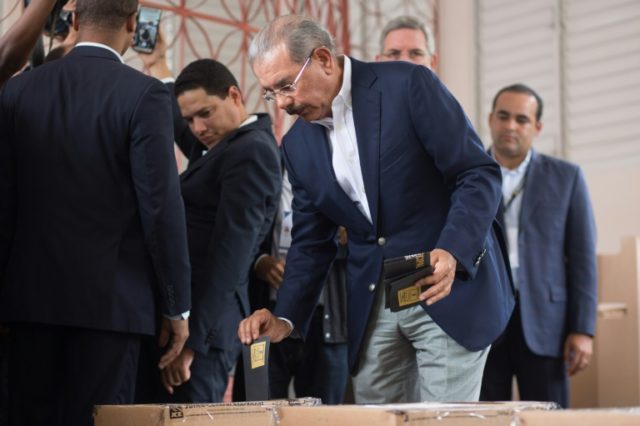Santo Domingo (AFP) – Dominican Republic incumbent leader Danilo Medina seemed destined for a sweeping victory in the country’s presidential election Sunday, according to early official results, in a vote marked by long lines, technical difficulties and staff walkouts.
With just over a quarter of the results in, Medina had won 61.7 percent of the vote, according to preliminary figures released by government election authorities.
If the results hold, Medina, a member of the Party of Dominican Liberation (PLD), would avoid a runoff vote with his nearest rival, Luis Abinader of the Modern Revolutionary Party (PRM), who won nearly 36 percent of the vote.
“I voted for continuity. Danilo needs another four years to improve safety and work with the schools,” Roxana Almonte, a 58-year-old secretary at a school in downtown Santo Domingo, told AFP.
Medina’s centrist PLD party has been in power for 12 years in the Spanish-speaking country, which shares the island of Hispaniola with its troubled neighbor, Haiti.
The president was favored to beat his seven rivals, especially since the breakup of the once powerful Dominican Revolutionary Party (PRD). Abinader, 48, now belongs to a break-off faction.
Medina also enjoys a stellar 89 percent approval rating, according to a survey by Mexican consultancy Mitofsky, making the 64-year-old the most popular leader in Latin America.
– Ballot box headaches –
Authorities in the popular Caribbean tourist destination, which is beset by widespread poverty, prolonged the vote by an hour after some polling centers opened up to two hours late.
The delays were due to glitches with electronic equipment and a mass resignation of some 3,000 technical assistants, according to the head of the electoral commission, Roberto Rosario, who gave no details on why the workers quit.
Medina called the resignations “irresponsible” as he cast his ballot at a school in the capital of Santo Domingo.
Many polling centers switched to manual balloting due to issues with electronic voting, which was used for the first time.
Rosario described the problems as “normal”.
Earlier, he promised “the most transparent elections in the history of our democracy”.
But some voters however were angry at the polling station problems.
“I got up early because I have to work… I want to vote and couldn’t,” said Mireya de la Cruz, a tourism worker who queued at a school.
– Poverty a problem –
The Dominican Republic’s economy is booming thanks to millions of tourism dollars from foreigners flocking to the country’s luxury hotels and beaches. It grew seven percent last year and inflation stood at 2.3 percent.
But 40 percent of the nation’s 10 million people are estimated to live in poverty and the unemployment rate is about 14 percent, according to government figures.
“Everything is expensive — fuel, food,” said William Mercedes, a 50-year-old farm worker. “We have a lot of poverty, and there are few jobs.”
Critics complain that crime has worsened under Medina and say his party has been in power for too long.
Medina also faces allegations of misusing electoral funds and broad international criticism over policies that discriminate against the Dominican-born children of Haitian migrant workers.
Many of Medina’s supporters tout the state of the economy and improvements in education as his major accomplishments.
When Medina was elected in 2012 he was supposed to be limited to one four-year stint as president. But he passed a reform in 2015 that has allowed him to run for reelection.
Medina’s rival Abinader blamed the president for government corruption and the country’s high crime rate.
“We have two options here: democracy or one-party dictatorship,” said Abinader, a wealthy businessmen of Lebanese ancestry, at a recent public appearance in a working-class neighborhood.
Some 6.7 million of the Dominican Republic’s 10 million residents are eligible to vote, with some 3,000 observers on hand to monitor the process.
Also being elected are 32 senators, 190 lower house deputies and local officials, with candidates from 26 different parties participating.

COMMENTS
Please let us know if you're having issues with commenting.